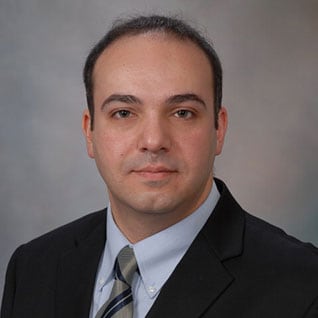/prod01/channel_2/media/mccms/content-assets/academics/residencies-and-fellowships/general-surgery-residency-florida/Sanjay-P.-Bagaria,-M.D.-512X512.jpg)
Sanjay Bagaria, M.D.
Associate Professor of Surgery
Interests:
- Immunotherapy
- Melanoma
- Sarcoma
- Breast cancer
- Gastrointestinal malignancies
- Sentinel lymph node biopsy
- Molecular profiling of cancer
/prod01/channel_2/media/mccms/content-assets/academics/residencies-and-fellowships/general-surgery-residency-florida/3894278_0015-1024X512.jpg)
The Division of General Surgery at Mayo Clinic's campus in Jacksonville, Florida, includes a renowned group of fellowship-trained surgeons. Collectively, the division performs more than 1,700 operations annually.
Surgeons at Mayo Clinic provide state-of-the-art care to patients with oncologic and nononcologic diagnoses. Faculty members specialize in minimally invasive surgery of the liver, pancreas, endocrine system, gastrointestinal tract, colon and rectum, and vascular system.
In addition, they utilize advanced technologies such as intraoperative ultrasound, robotic surgery, and novel energy sources to aid in surgical excision. The division prides itself on the incorporation of innovative techniques to common surgical procedures.
Faculty provides modern, comprehensive care for both routine problems and tertiary and quaternary complex surgical cases. The Mayo Clinic Model of Care is a defining feature of our practice and provides the collaborative foundation for our approach to patient care by facilitating collegial relationships amongst all medical and surgical specialties. Together, this allows us to find the best treatment approach for each patient.
We appreciate the opportunity to share with you what the General Surgery Residency at Mayo Clinic in Florida has to offer. This training program is designed to emphasize the essentials for you to become competent and confident in the practice of general surgery. We are dedicated to maximizing the educational environment for our trainees.
As program director and associate program director, we view our roles as mentors in your surgical training. Our program offers an intimate, apprenticeship model of training with small teams of residents and dedicated clinician-educators. Together, we offer high-quality, efficient patient care in an environment that encourages active learning.
Early exposure to patient care and attention to technical skill development fosters resident confidence. An in-depth simulation curriculum aids in skill proficiency. Core rotations are specifically designed to build upon one another and previously mastered skills.
Throughout the length of training, residents are supervised by general surgeons, each of whom is fellowship-trained within surgery (breast, colorectal, hepatobiliary, minimally invasive, plastics, surgical oncology and vascular). As a result, residents are exposed to all aspects of standard and complex surgical procedures. Our program emphasizes:
We hope this website provides you with insight into our program. We are proud of our graduates and their accomplishments and are confident we can train you to succeed in whatever aspect of surgery you choose. Please do not hesitate to contact us should you have any additional questions.
Thank you for your interest in our general surgery residency.
Enrique Elli, M.D.
General Surgery Residency Program Director
Professor of Surgery
Houssam Farres, M.D.
General Surgery Residency Associate Program Director
Assistant Professor of Surgery
Pictured left to right: Drs. Elli and Farres.
_16382161_20220613.jpg)

In addition to caring for patients in clinical practice, Mayo Clinic's faculty is committed to teaching and facilitating the growth of medical knowledge. Many of our faculty members have published and lectured extensively and are highly regarded in their fields.
You have direct access to them throughout your training, giving you the opportunity to learn directly from experienced surgeons.
Faculty advisers are available to provide comprehensive educational advice and personal support. You meet with your adviser periodically throughout the program to review your progress and career goals, and ensure that your educational needs are being met. Also, your adviser may serve as a contact point for introducing you and your family to Jacksonville, Florida, and the Mayo Clinic system.
Many prominent professors visit Mayo Clinic each year. They present their work during lectures, participate in hospital rounds and have informal discussions with trainees. You are encouraged to take full advantage of these educational opportunities.